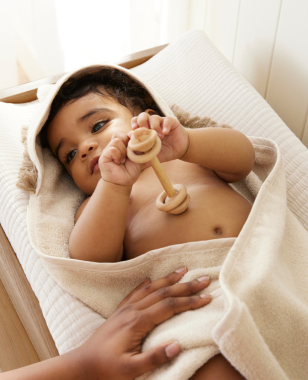5 Things to Know About Pacifiers
Pacifier, binky, paci - whatever you choose to call it, this little device is many parents' saving grace. And they're frequent fliers on lists of small baby gifts. But for new parents, the decision about whether to use a pacifier can pose a lingering question. To help answer the question, join us at Pottery Barn Kids in exploring five essential details that you should know before you decide to use pacifiers.

Types of Pacifiers
There are two main types of pacifiers: multiple-piece and single-piece. Multiple-piece pacifiers have a nipple, guard and ring-like handle. Manufacturers make each piece separately before assembling the pacifier. This is unlike single-piece pacifiers, which are made of molded silicone, plastic or latex.
Beyond those two types of pacifiers, there are also stuffed animal pacifiers (which have nipples attached to plush animals) and feeding pacifiers (which are popular for babies six months of age and older). These baby pacifiers have an attached food storage chamber you can fill with pureed food or frozen pieces of fruit for the baby to enjoy with minimal mess.
How-to Guide for Cleaning Pacifiers
Cleaning pacifiers is a lot like cleaning baby bottles and tableware. Sterilize a new pacifier by placing it in boiling water for five minutes. Allow it to cool completely before using it for the first time. In between uses, wash the pacifier with dish detergent and soap. Rinse it thoroughly and allow it to dry in a well-ventilated area. Keep a few pacifiers on hand so you can let one dry out while your baby uses another.
Pacifier Pros
The benefits of pacifiers go beyond simply soothing your baby. Pacifiers have some great additional benefits, including:
- Lowering the risk of sudden infant death syndrome (SIDS). Doctors aren't sure why, but research has shown that giving babies pacifiers while they sleep in their cribs, bassinets or in your arms could lower the risk of SIDS by 50 percent or more.
- Satisfying babies' sucking reflex. Babies naturally need to perform that sucking motion. Taking a bottle or latching on to the breast typically fulfills it. Babies often have the desire to suck even after their bellies are full. This is where pacifiers really shine.
- Encouraging self-soothing. In addition to comforting your baby, giving them a pacifier can actually help them learn how to control their feelings. Plus, it makes them more relaxed. A relaxed, calm baby always means relaxed, calm parents.
Pacifier Cons
The benefits of pacifiers often outweigh the drawbacks. However, it helps to be aware of both sides before deciding whether to include pacifiers as part of your collection of baby gear.
- Pacifiers can cause nipple confusion. This is particularly important for parents who choose to breastfeed. Although it's a natural process, it isn't always easy. It can take a bit of time for babies to get the hang of latching on. That's why most doctors and lactation consultants will suggest that nursing parents avoid using a pacifier for the first few weeks while they develop a solid nursing pattern.
- It may increase babies' risk of ear problems. There has been one research study that suggests children who use baby pacifiers have roughly twice the risk of experiencing multiple ear infections as babies who don't use them.
- Baby pacifiers can affect teeth. This is a bit of a good news/bad news situation. The bad news is that long-term use of pacifiers can cause tooth troubles. But the good news is that short-term use is absolutely fine. Plus, dentists will tell you that any trouble with your baby's growing teeth will self-correct within six months after you stop using the pacifier. Simply stop using it before your baby reaches 24 months of age.
Should You Use a Pacifier?
Whether you choose to use a pacifier or skip it is entirely up to you. But if you're wondering if you should use a pacifier for your baby, ask yourself a few questions:
If the answer to any of these questions is "yes," using a pacifier may well be the perfect solution for your baby. Give it a try!









